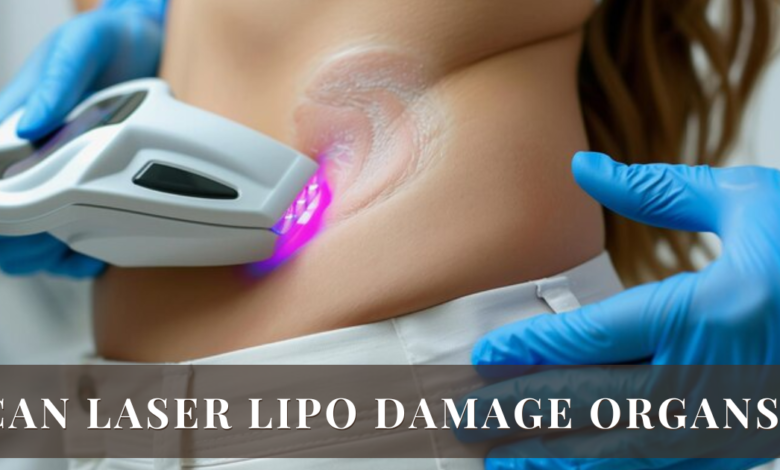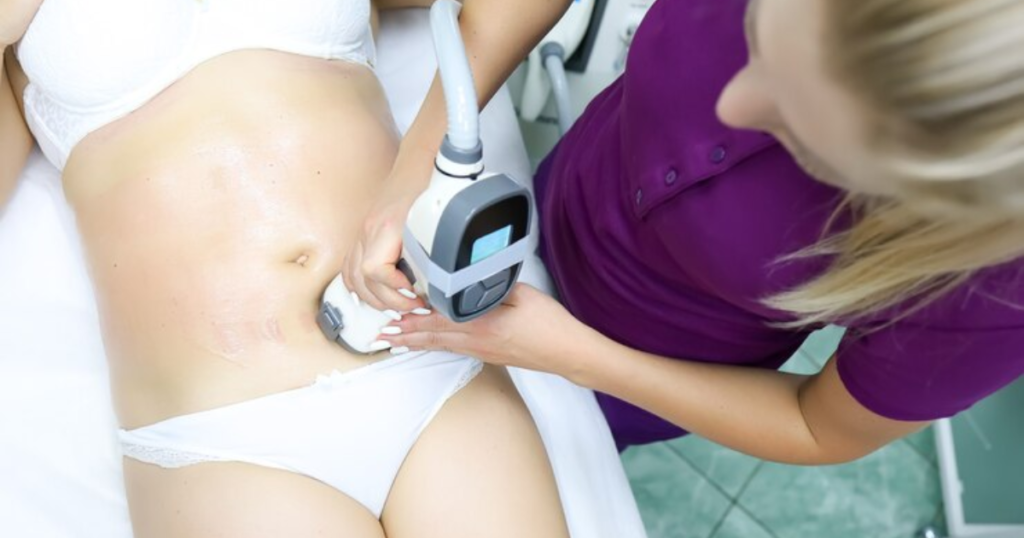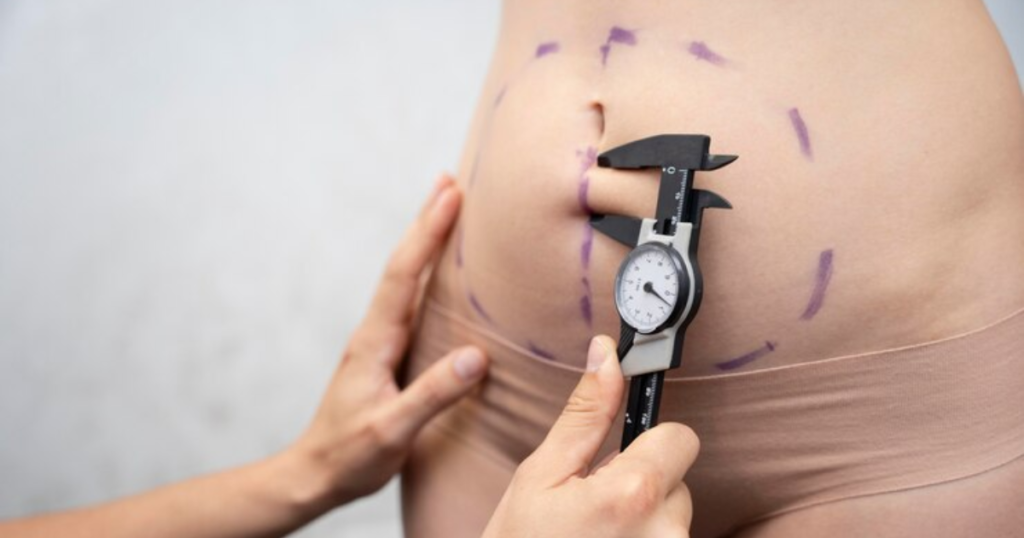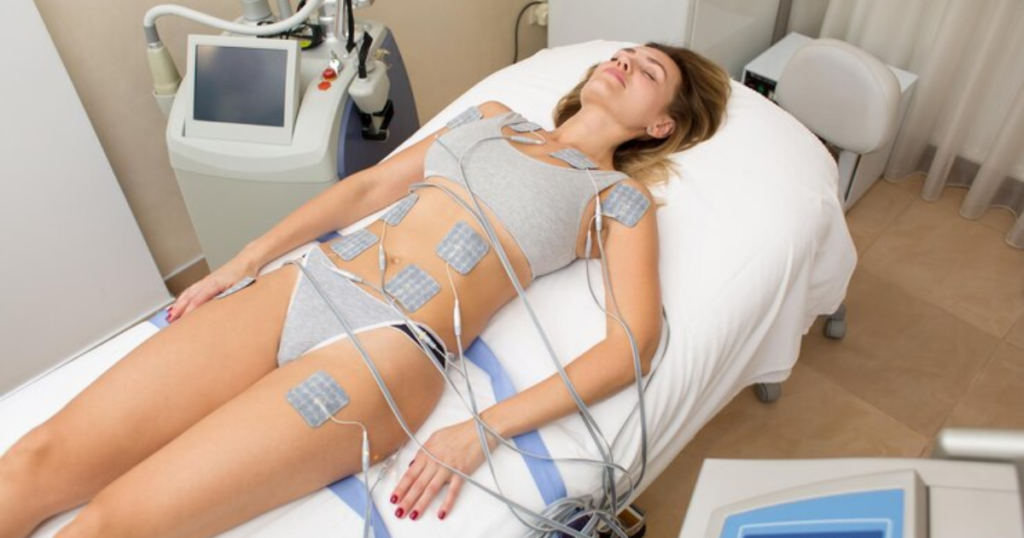Can Laser Lipo Damage Organs?

Laser liposuction, or laser lipo, is a popular way to reduce fat without surgery. But many people wonder if laser lipo can damage your organs. This article will look into this question and give you all the facts so you can decide if it’s right for you.
What is Laser Lipo?
Excess body fat can be removed with a minimally invasive cosmetic surgery called laser liposuction, or laser lipo. In contrast to conventional liposuction, which requires physically extracting fat through a tube, laser lipo liquefies fat cells to facilitate their removal. This is how it usually operates:
- Procedure: A laser fiber is placed beneath the skin after a little incision is created. Targeting fat cells, the laser energy breaks them down.
- Fat Removal: The body can naturally process the liquefied fat over time, or it can be removed via a tiny cannula, or thin tube.
- Skin Tightening: The laser’s heat also promotes the creation of collagen, which helps to firm and tighten the skin in the treated area.
How Laser Lipo Works?
A tiny incision is made in the desired area before a thin tube known as a cannula is introduced to perform liposuction. After the fat cells are broken up by moving the cannula back and forth, they are removed by vacuum. Although this method works well to remove fat, if it is not done appropriately, it might occasionally result in difficulties.

Potential Benefits of Laser Lipo
Comparing laser liposuction to conventional liposuction techniques, or laser lipo, reveals a number of possible advantages:
- Precision: By accurately targeting fat cells with laser energy, laser lipo can produce more exact contouring of the treated areas.
- Minimally Invasive: Compared to standard liposuction, it sometimes requires fewer incisions and causes less tissue stress.
- Faster Recovery: Patients may recover more quickly because there is less stress and edema after liposuction than with standard liposuction.
- Skin Tightening: By encouraging the creation of collagen, the heat from the laser can improve skin tightness in the regions that are being treated.
- Decreased Bruising and Pain: Compared to traditional liposuction, laser lipo may reduce post-procedural bruising and pain.
- Versatility: It can be applied to various body locations, including smaller and more delicate areas where standard liposuction may be more difficult.
- Improved outcomes: Some research indicates that laser lipo may produce smoother and more uniform outcomes than traditional techniques.
- Localized Fat Reduction: Laser lipo is an efficient way to target specific pockets of fat that resist diet and exercise.
Are There Any Long-Term Side Effects of Laser Lipo?
Patients should consider the following potential long-term negative effects of laser liposuction, as with any medical procedure:
- Skin Irregularities: Although uncommon, some patients may notice irregular skin contours or texture alterations in the treated area.
- Scarring: While laser liposuction often uses smaller incisions than traditional liposuction, there is still a danger of scarring, particularly if proper wound care is not followed.
- Skin Sensitivity: The heat from the laser may induce temporary or permanent changes in skin sensitivity, such as numbness or tingling.
- Hyperpigmentation or hypopigmentation: Skin color changes may occur in the treated area, but these are often transitory.
- Infection: As with any surgical operation, there is a risk of infection, which can be reduced with adequate postoperative care.
- Burns: Improper laser use can result in burns on the skin, however, this danger is reduced with professional and experienced practitioners.
- Nerve Damage: In rare situations, nerve damage may occur, resulting in chronic numbness or altered sensation in the treated area.
- Delayed Healing: Some patients may experience delayed healing, especially if they have underlying medical issues or do not adhere to post-operative care guidelines.
Can Laser Lipo Damage Organs?
Laser liposuction is a cosmetic procedure that uses laser energy to remove fat deposits from specific areas of the body. This minimally invasive procedure of laser lipo can cause tissue damage, internal organs damage, infection, nerve damage, and fat embolism.
The risk increases if the procedure is performed by an inexperienced or unqualified practitioner, especially in areas with less fat and closer proximity to organs.
To minimize the risk of organ damage and complications, it is essential to choose a qualified doctor, conduct a thorough pre-procedure assessment, follow post-procedure instructions, and monitor for symptoms.

What Organs Are at Risk of Damage During Liposuction?
Even though laser lipo is very common, there are risks involved, especially with internal organs damage. To guarantee the procedure’s safety and success, it is crucial that patients and surgeons are aware of these dangers.
1. Abdomen
One popular target location for liposuction is the abdomen. But there are serious concerns since internal organs like the kidneys, liver, and intestines are so close together. Infection, hemorrhage, and even organ failure can result from an unintentional puncture or injury to these organs.
Risk Mitigation:
- Make sure the surgeon has performed several abdomen liposuction procedures.
- using imaging methods, such as ultrasonography, to direct the cannula.
- comprehensive pre-operative evaluation to find any anatomical abnormalities.
2. Thorax
Thoracic liposuction poses a risk to the heart and lungs, especially in the area surrounding the rib cage and chest. Air pours into the chest cavity and can cause a pneumothorax, a potentially fatal condition, when the pleura, the membrane protecting the lungs, is punctured.
Risk Mitigation:
- Minimizing the cannula’s mobility by using the tumescent method.
- Vital indicators are closely monitored throughout the process.
- Instant access to emergency medical care.
3. Back and Flanks
Although less frequent, lower back and flank liposuction can likewise be hazardous to the kidneys and spine. Significant discomfort, infections, and long-term functional problems can result from damage to these locations.
Risk Mitigation:
- Accurate marking of the surgical site prior to surgery.
- Smaller cannulas are used to lower the possibility of deep tissue injury.
- Imaging after surgery to make sure no unintentional injury happened.
4. Arms and Legs
Although liposuction on the arms and legs is usually thought to be less risky, underlying structures like blood arteries, muscles, and nerves can still be harmed. Damage to these can result in circulation problems, persistent pain, and function loss.
Risk Mitigation:
- Using a careful method with little cannula movement.
- Physical therapy following surgery to promote healing.
- Routine check-ups to keep an eye out for any issues that develop later.
What Causes Organs Damage During Laser Lipo?
Numerous elements may combine to cause damage to organs during laser lipo. By being aware of these reasons, procedures can be safer and dangers can be reduced.
1. Improper Technique
Misuse of the cannula during laser lipo is one of the main reasons for damage to organs. The cannula has the potential to puncture or harm internal organs if it is inserted too deeply or moved too quickly. This is more likely to happen if a less qualified or inexperienced practitioner performs the procedure.
2. Inadequate Training and Experience
The effectiveness of liposuction is greatly dependent on the surgeon’s training and experience. Inexperienced or undertrained surgeons are more prone to make mistakes that might cause complications, including damage to organs. Selecting a board-certified plastic surgeon with experience doing liposuction operations is crucial.
3. Excessive Fat Removal
Overdoing it on fat removal in one session raises the possibility of consequences, such as organ damage. Excessive fat removal can put strain on the body’s tissues and structures, which might result in unintentional injury. The recommended criteria for the quantity of fat that can be safely removed in a single procedure should be followed by surgeons.
4. Incorrect Cannula Size
The possibility of organ injury during liposuction might also be influenced by the size of the cannula utilized. A cannula that is too big increases the chance of puncturing internal organs, while a cannula that is too small might not be able to remove fat efficiently, resulting in longer treatments and a higher risk of problems.

Who is the Ideal Candidate for Laser Lipo?
Laser lipo is a minimally invasive cosmetic procedure that targets and melts away fat cells, providing effective body contouring and fat reduction. The ideal candidate for laser lipo should be healthy, stable, and have specific fat deposits resistant to traditional weight loss methods.
They should also have good skin elasticity, be non-smokers, have realistic expectations about the results, be committed to maintaining results through a balanced diet and regular exercise, and be willing to consult with a qualified practitioner to determine their suitability for the procedure. The procedure is not a substitute for a healthy lifestyle or a solution for obesity.
| Criteria | Description |
|---|---|
| Age | Adults aged 18 and older |
| Body Mass Index (BMI) | Within 25-30 BMI range |
| Health Status | Generally healthy without significant medical conditions |
| Skin Elasticity | Good skin elasticity for better post-procedure results |
| Lifestyle | Maintains a healthy diet and regular exercise routine |
| Target Areas | Small, localized fat deposits resistant to diet and exercise |
| Realistic Expectations | Understands the procedure’s capabilities and has realistic goals |
| Non-smoker | Ideally a non-smoker for better healing and recovery |
| Commitment | Willing to follow post-procedure care instructions |
| Stable Weight | Near their ideal weight with stable body weight |
Can Laser Lipolysis Cause Cancer?
Laser lipolysis, commonly known as laser-assisted liposuction or laser liposuction, is usually regarded as safe when performed by trained specialists. Concerns have been raised concerning its potential link to cancer due to the usage of laser energy and its effects on tissues.
As of yet, there is no solid evidence linking laser lipolysis to cancer. The laser utilized in these operations normally operates at wavelengths that are not known to cause cancer. The process uses laser radiation to liquefy fat cells beneath the skin, which are then evacuated via a tiny tube (cannula).
However, like with any medical operation utilizing energy-based devices, laser lipolysis has inherent hazards, such as burns, infections, and uneven skin contouring. Before considering any cosmetic surgery, you should consult with a knowledgeable healthcare physician about the potential risks and benefits.
Read More: White Stringy Stuff in Mouth When You Wake Up
Conclusion
Laser lipo is a new way to remove fat from your body that is less painful and heals faster than old methods. There is very little chance of getting your organs damage by laser lipo, but it is important to pick a skilled doctor and follow all safety rules. Knowing how laser lipo works and what could go wrong helps you decide if it is a good choice for you.
People Also Ask
1. What is laser lipo, and how does it work?
Laser lipo, or liposuction, is a popular method for removing stubborn fat from the body using lasers, breaking down fat cells and sucking them through a tube.
2. Can laser lipo damage my organs?
No, laser liposuction is intended to target only fat cells and not your organs. Doctors are trained to avoid crucial sections of the body, such as your organs. The laser is carefully controlled, and the operation is typically highly safe when performed by an expert. However, like with any medical operation, there may be hazards, so consult a skilled and experienced doctor.
3. Are there any side effects of laser lipo?
Some people may develop negative effects with laser lipo, such as edema, bruising, or redness where the fat was removed. These side effects are typically minimal and resolve within a few days. Serious adverse effects are uncommon, but it is critical to follow your doctor’s instructions and care for yourself following the treatment to reduce any risks.
4. How can I make sure my laser lipo procedure is safe?
Ensure laser lipo treatment safety by selecting a skilled specialist, checking feedback, ensuring a clean, well-equipped clinic, expressing concerns during consultation, and following pre- and post-procedure instructions.
5. What should I do if I feel something is wrong after my laser lipo?
Following a laser lipo operation, report any unusual symptoms or concerns to your doctor immediately to ensure proper care and ensure proper functioning.





I do believe all the ideas youve presented for your post They are really convincing and will certainly work Nonetheless the posts are too short for novices May just you please lengthen them a little from subsequent time Thanks for the post
Your blog is a true gem in the world of online content. I’m continually impressed by the depth of your research and the clarity of your writing. Thank you for sharing your wisdom with us.
Your blog is a testament to your dedication to your craft. Your commitment to excellence is evident in every aspect of your writing. Thank you for being such a positive influence in the online community.